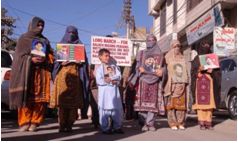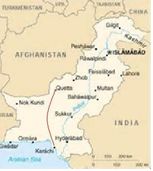
Civil society must join the peaceful long march in solidarity with the relatives of disappeared persons and provide all possible assistance to the marchers
 The relatives of missing persons from Balochistan started a 730 kilometre peaceful long march for the recovery of disappeared persons. The participants assembled and started their march from the Quetta Press Club yesterday. The rally includes women and children and will reach Karachi, the capital of Sindh province after one week. The long march is lead by a seven-year-old son of Jalil Reki, who was extrajudicially killed after a year of his disappearance in an ISI torture cell. Mr. Nasrullah Baloch, the chairperson of Voice for Missing Baloch Persons (VMBP) whose uncle has been missing for 11 year years, Mr. Mama Qadeer Baloch, whose cousin has been missing since 2001 and whose son who was killed during his detention by the military, and Ms. Farzana Majeed, the sister of Mr. Zakir Majeed Baloch, who has been missing since 2009 after his arrest by the Frontier Corp (FC) are also taking part in the march.
The relatives of missing persons from Balochistan started a 730 kilometre peaceful long march for the recovery of disappeared persons. The participants assembled and started their march from the Quetta Press Club yesterday. The rally includes women and children and will reach Karachi, the capital of Sindh province after one week. The long march is lead by a seven-year-old son of Jalil Reki, who was extrajudicially killed after a year of his disappearance in an ISI torture cell. Mr. Nasrullah Baloch, the chairperson of Voice for Missing Baloch Persons (VMBP) whose uncle has been missing for 11 year years, Mr. Mama Qadeer Baloch, whose cousin has been missing since 2001 and whose son who was killed during his detention by the military, and Ms. Farzana Majeed, the sister of Mr. Zakir Majeed Baloch, who has been missing since 2009 after his arrest by the Frontier Corp (FC) are also taking part in the march.
 Participants of the ‘long march’ began their journey at the local press club and it will culminate in a sit-in outside the Karachi Press Club where they will have an indefinite hunger strike. The participants are raising slogans against Pakistan and demanding the freedom of Balochistan from Pakistan.
Participants of the ‘long march’ began their journey at the local press club and it will culminate in a sit-in outside the Karachi Press Club where they will have an indefinite hunger strike. The participants are raising slogans against Pakistan and demanding the freedom of Balochistan from Pakistan.
Balochistan has been facing the worst kind of state sponsored terrorism since 2001 when the military started arresting the activists and political workers and killing them extrajudicially after detaining them for long periods in military torture cells. The nationalist groups in Balochistan claim that up to the present day 18,000 persons are missing or have been extrajudicially killed whereas independent sources claim that more than 6,000 persons are missing after their arrest. It is also reported that since June 2010 730 missing persons were extrajudicially killed after their arrest and disappearance. The government of Balochistan has itself confirmed the extrajudicial killings of 530 persons during the same period. The official list also confirms that 2,500 persons are missing after their arrest.
At the time of the start of the long march the Chief Minister of Balochistan, Dr. Abdul Malik was addressing a ‘meet the press’ at the Karachi Press Club and high lighting his government’s endeavours to maintain the law and order. However, with a smile he confessed that his government had failed to solve the issue of disappearances. This was a clear indication of the weakness on the part of the government of Balochistan in that it does not have control of the law enforcement agencies to solve the issue of disappearances which is increasing with the passing of every day.
The people of Balochistan have resorted to the long march of 730 kilometres after finding no respite in the extrajudicial killings and enforced disappearances. They have also been betrayed by the judiciary, particularly the Supreme Court of Pakistan which is hearing cases of enforced disappearances but has done nothing to stop them. This has happened despite the fact that even when evidence is presented to the Supreme Court about the presence of many disappeared persons in military torture cells the courts have failed to take action against the military and other law enforcement agencies. The military has also arrogantly refused to appear before the courts and on many occasions they have used the media houses to malign the court which has forced the judicial officers to just use harsh words. In fact, the court has not decided on any case of disappearance since 2005.
The participants of the march said they were undertaking the long and arduous journey to highlight the plight of missing persons who are languishing in secret detention centres. The participants said that they want to draw the attention of the international community to the issue of missing persons because all institutions of the country, including the higher judiciary, have failed to ensure the recovery of disappeared persons or stop the practice of dumping their mutilated bodies.
The Asian Human Rights Commission (AHRC) expresses its solidarity with the Baloch people in their struggle for the recovery of missing persons and condemns the extrajudicial killings. It urges the civil society of Pakistan not to sit aloof when Balochistan is bleeding and every day the extrajudicial killings by the law enforcement agencies continue. The Balochis are being pushed to the corner for demanding their fundamental rights. The civil society must join the long march and make it successful so that the menace of disappearances and extrajudicial killings can be eliminated from the country. The civil society organizations must arrange camps along the route of the long march and provide all the essential items to the protestors, especially the women and children.
The AHRC warns the government of Pakistan, the military and the law enforcement agencies that if they take violent action against the peaceful marchers they will face dire consequences and the peace of the country will be further shattered. The international community will be witnessing the march and supporting the lawful demands of the people. Any violence against the marchers or disruption of the march itself will reflect very badly on the country and the government of Prime Minister Nawaz Sharif.
To support this case, please click here: SEND APPEAL LETTER
SAMPLE LETTER